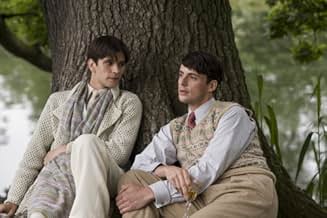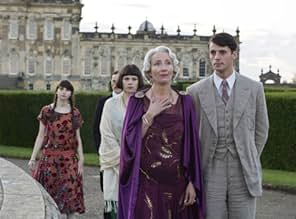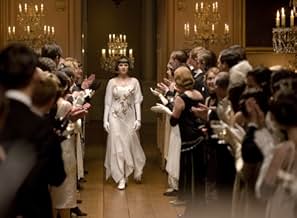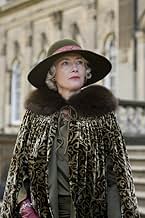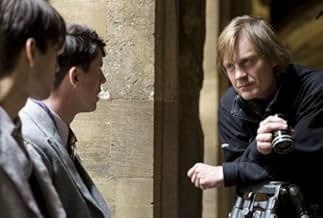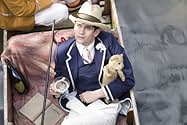A poignant story of forbidden love and the loss of innocence set in England prior to World War II.A poignant story of forbidden love and the loss of innocence set in England prior to World War II.A poignant story of forbidden love and the loss of innocence set in England prior to World War II.
- Director
- Writers
- Stars
- Awards
- 11 nominations total
- Director
- Writers
- All cast & crew
- Production, box office & more at IMDbPro
Featured reviews
It's attributed to just about everybody - from Ginger Rogers to Milan Kundera - and it sounds so right: "There are no small parts, only small actors."
If you want proof and a real understanding of the adage, revisit "Brideshead Revisited," and behold the miracle of Emma Thompson's Lady Marchmain, sucking the life out of anything and anybody she touches, and Michael Gambon's delightfully dissolute Lord Marchmain. She has about 10 minutes on the screen, he perhaps four, and yet their characters will follow you out of the theater, and stay with you at length.
Thompson's work is especially dazzling because the mean, sanctimonious character is so clearly alien to the actress (in fact, I suspected miscasting when I first heard of her assignment) and also as the character is so exaggerated, almost a caricature. And yet, Thompson gives the challenge her all, and walks away with it; the performance has Best Supporting Actress written all over it.
It's difficult to believe that the man you see as Marchmain is the same actor who was the "Singing Detective" (of the superb BBC series, not the Robert Downey Jr. mishap). Gambon has a range as wide as all outdoors, and you never ever see effort in the performance. His amiable Marchmain - subtly hinting at a complex character under the surface - has a physical similarity to Gambon's Uncle Vanya on the London stage, but otherwise, it's a unique creation.
What else is there to this new "edition" of "Brideshead"? A great deal, but only if you're among those who missed both Evelyn Waugh's novel and the wonderful Granada TV realization 27 long years ago - Irons! Gielgud! Olivier! - how can you compete with that? So, if it's a first-time visit, see the movie by all means; if you can recite lines from the book or the TV series, you can survive without the new version.
In 135 minutes, the film is handling well what the TV series did so completely in - yes - 13 HOURS. Obviously, except for the basic story line (script by Jeremy Brock, of "The Last King of Scotland"), this is a different kind of animal, still "leisurely" enough, but unable to luxuriate in the smallest details as the series did. The director is Julian Jarrold, and he is doing far better than in his recent "Becoming Jane," keeps the story moving in a smooth fashion.
As to the leading roles in the film, they are all well acted, but without great impact. Matthew Goode is Charles Ryder, the focal character; Ben Whishaw is the slightly over-flamboyant Sebastian Flyte (who needs understating more than exaggerating - Anthony Andrews' performance in the TV series was exactly right); Hayley Atwell is Sebastian's sister (and rival for Charles' affection).
One amazing thing about "Brideshead" is how this story from a different time, about characters from a different world, remains interesting and meaningful. It's almost as if Waugh's work was bulletproof - not that these filmmakers were less than respectful to the author. A better test would be a Eurotrash opera version, heaven forfend.
If you want proof and a real understanding of the adage, revisit "Brideshead Revisited," and behold the miracle of Emma Thompson's Lady Marchmain, sucking the life out of anything and anybody she touches, and Michael Gambon's delightfully dissolute Lord Marchmain. She has about 10 minutes on the screen, he perhaps four, and yet their characters will follow you out of the theater, and stay with you at length.
Thompson's work is especially dazzling because the mean, sanctimonious character is so clearly alien to the actress (in fact, I suspected miscasting when I first heard of her assignment) and also as the character is so exaggerated, almost a caricature. And yet, Thompson gives the challenge her all, and walks away with it; the performance has Best Supporting Actress written all over it.
It's difficult to believe that the man you see as Marchmain is the same actor who was the "Singing Detective" (of the superb BBC series, not the Robert Downey Jr. mishap). Gambon has a range as wide as all outdoors, and you never ever see effort in the performance. His amiable Marchmain - subtly hinting at a complex character under the surface - has a physical similarity to Gambon's Uncle Vanya on the London stage, but otherwise, it's a unique creation.
What else is there to this new "edition" of "Brideshead"? A great deal, but only if you're among those who missed both Evelyn Waugh's novel and the wonderful Granada TV realization 27 long years ago - Irons! Gielgud! Olivier! - how can you compete with that? So, if it's a first-time visit, see the movie by all means; if you can recite lines from the book or the TV series, you can survive without the new version.
In 135 minutes, the film is handling well what the TV series did so completely in - yes - 13 HOURS. Obviously, except for the basic story line (script by Jeremy Brock, of "The Last King of Scotland"), this is a different kind of animal, still "leisurely" enough, but unable to luxuriate in the smallest details as the series did. The director is Julian Jarrold, and he is doing far better than in his recent "Becoming Jane," keeps the story moving in a smooth fashion.
As to the leading roles in the film, they are all well acted, but without great impact. Matthew Goode is Charles Ryder, the focal character; Ben Whishaw is the slightly over-flamboyant Sebastian Flyte (who needs understating more than exaggerating - Anthony Andrews' performance in the TV series was exactly right); Hayley Atwell is Sebastian's sister (and rival for Charles' affection).
One amazing thing about "Brideshead" is how this story from a different time, about characters from a different world, remains interesting and meaningful. It's almost as if Waugh's work was bulletproof - not that these filmmakers were less than respectful to the author. A better test would be a Eurotrash opera version, heaven forfend.
The Granada people got it right in 1979 when they set out to film "Brideshead Revisited." They realized that Evelyn Waugh's great novel could not be done justice in a single film of two or even three hours. It had to be made into an extended mini-series. Thus, the great 11-part TV series of 1981 - the first and only great film version of Waugh's novel.
Yet, in 2008, BBC Films thought it was time for a remake. The result is this film adaptation. It lasts just over two hours. It skims over or skips characters. It changes the focus, and thus the story. It misses the essence of Waugh's story completely. So, it's more proper to call this a major revision - a revised story based on Waugh's novel.
Even Emma Thompson as Lady Marchmain and Michael Gambon as Lord Marchmain can't lift this revised story to an acceptable imitation. Apparently, because the story is so profound, BBC films chose to promote this as a remake of the TV series from Waugh' great novel. That being the case, one is led naturally to comparison. Thus, this film fails.
Still, for some fair acting by the cast, I give it five stars as though it were a different story entirely. After all, the cast can't be held accountable for the plot. Although Thompson's almost muted performance hints that she may realize she's in a far inferior work that has borrowed a great title.
Yet, in 2008, BBC Films thought it was time for a remake. The result is this film adaptation. It lasts just over two hours. It skims over or skips characters. It changes the focus, and thus the story. It misses the essence of Waugh's story completely. So, it's more proper to call this a major revision - a revised story based on Waugh's novel.
Even Emma Thompson as Lady Marchmain and Michael Gambon as Lord Marchmain can't lift this revised story to an acceptable imitation. Apparently, because the story is so profound, BBC films chose to promote this as a remake of the TV series from Waugh' great novel. That being the case, one is led naturally to comparison. Thus, this film fails.
Still, for some fair acting by the cast, I give it five stars as though it were a different story entirely. After all, the cast can't be held accountable for the plot. Although Thompson's almost muted performance hints that she may realize she's in a far inferior work that has borrowed a great title.
As with any film which follows a beloved mini-series it is nearly impossible to escape the shadow. When watching this film you'll find yourself constantly comparing it to the mini-series and more often than not the memory of the mini-series comes out ahead.
That being said, I still very much enjoyed the film. As with other recent English remakes (Pride & Prejudice, BBC's Sense & Sensibility) you really appreciate the beauty of modern film making. The cinematography, the score, and the ever beautiful Castle Howard, Venice, and Oxford alone are worth the watching in my opinion. There are also some great performances. Matthew Goode's Charles rivals that of Jeremy Iron's, Hayley Atwell's Julia (in a more central role than that of the mini-series) was also quite good. I also found myself rather enjoying Charles' wife Celia (Anna Madeley) even in such a small role.
The real failure of the film seems to be the difficulty with compressing 11 hours into 2. Everything is forced to move faster and the more quite, gentle, and simple scenes are lost. What's left then is a distillation of the most dramatic moments. As a result the film loses the subtlety of the mini-series. The religious bits are played up a bit too much and makes the characters slightly unbelievable. Emma Thompson is great as always, but her character of Lady Marchmain as written is too over bearing, too controlling, too inhuman. The character of Sebastian is louder than in the mini-series and becomes jaded before you care much for him. Indeed, I didn't find myself caring particularly much for any of the characters except perhaps Charles.
Still, if you don't have 11 hours on hand to spend watching the mini-series, this is a suitable substitute and is worth watching at least once at any rate. As long as you don't go in expecting an equal to the mini-series you'll enjoy it and may even find a moment or two which improves upon the original.
That being said, I still very much enjoyed the film. As with other recent English remakes (Pride & Prejudice, BBC's Sense & Sensibility) you really appreciate the beauty of modern film making. The cinematography, the score, and the ever beautiful Castle Howard, Venice, and Oxford alone are worth the watching in my opinion. There are also some great performances. Matthew Goode's Charles rivals that of Jeremy Iron's, Hayley Atwell's Julia (in a more central role than that of the mini-series) was also quite good. I also found myself rather enjoying Charles' wife Celia (Anna Madeley) even in such a small role.
The real failure of the film seems to be the difficulty with compressing 11 hours into 2. Everything is forced to move faster and the more quite, gentle, and simple scenes are lost. What's left then is a distillation of the most dramatic moments. As a result the film loses the subtlety of the mini-series. The religious bits are played up a bit too much and makes the characters slightly unbelievable. Emma Thompson is great as always, but her character of Lady Marchmain as written is too over bearing, too controlling, too inhuman. The character of Sebastian is louder than in the mini-series and becomes jaded before you care much for him. Indeed, I didn't find myself caring particularly much for any of the characters except perhaps Charles.
Still, if you don't have 11 hours on hand to spend watching the mini-series, this is a suitable substitute and is worth watching at least once at any rate. As long as you don't go in expecting an equal to the mini-series you'll enjoy it and may even find a moment or two which improves upon the original.
Among many of the most prestigious literature selections, not to mention mini-series, Brideshead Revisited not only wasn't on my radar, I didn't even know if it would be the kind of well-regarded literature or mini-series I intended to watch. But as this newly revised picture, now a mere 136 minutes vs 10 hours, it looked interesting if only as a kind of "handsomely made" picture (you know the kind, along the lines of Atonement for recent comparison). I was also intrigued by the allure of a huge, sprawling mansion here called Brideshead, as it reminded me of Alain Resnais's film Last Year at Marienbad and how memories and recollections and lost love and hope is explored in the spaces of this dark, cold region of exquisite luxury. Some of that is explored in this film, and some of it... isn't.
It's for the most part a fairly tragic story of a young man, Charles (Matthew Goode, charming and suave but also subtle and down-beat, a really fine turn), who enrolls at Oxford and meets a meek/'fey' guy named Sebastian, and through him he's introduced (reluctantly in point of fact) to Sebastian's family, including his sister Julia, and his very cold and strident mother (Emma Thompson). Sebastian really wants Charles all for himself - it's a friendship that goes just a nose-hair's length into admitting homosexuality but never really goes that far despite all appearances to the contrary - but he becomes apart of the fold, and as well falling deeply in love with Julia against 'other' wishes (mostly the matriarch's over Charles's religion).
There's a lot of the fragility of the bourgeois on display here, the arrogance and detachment that's shown very closely by the director for maximum effect. Unlike a Resnais he's not about to get too experimental with the camera; he's a careful craftsman more often than not, allowing for just enough wonderment of the whole Brideshead atmosphere to really sink into how it could be a double-edged sword of perception. And as is bound to happen with material this sprawling (at one point time jumps back 10 years, then ahead 4 years, until we kind of know where we are), a lot seems to be cut out. While it altogether makes a coherent and entertaining enough picture, I wonder how much more of a benefit this would make as an epic, where we are absorbed more fully with the Oxford school or Charles and Sebastian or even the parents (who, thankfully, are played wonderfully here by cold-as-ice Thompson and fascinatingly guilt-ridden and subtle Michael Gambon), or how the wealth structure even works here.
Indeed, I found myself not so much involved with the Charles/Sebastian stuff, even as it's fairly well-acted and well-shot enough, as I was with the themes of religion raised in the picture. This caught me off guard and hinted at something deeper being expounded upon. Yet, again, we get just tastes of what's offered more than likely in the original text, tastes that are powerful like a 'last-rites' argument, and the tortured state of being raised from the cradle with an intense, overbearing Catholic conscience.
It's for the most part a fairly tragic story of a young man, Charles (Matthew Goode, charming and suave but also subtle and down-beat, a really fine turn), who enrolls at Oxford and meets a meek/'fey' guy named Sebastian, and through him he's introduced (reluctantly in point of fact) to Sebastian's family, including his sister Julia, and his very cold and strident mother (Emma Thompson). Sebastian really wants Charles all for himself - it's a friendship that goes just a nose-hair's length into admitting homosexuality but never really goes that far despite all appearances to the contrary - but he becomes apart of the fold, and as well falling deeply in love with Julia against 'other' wishes (mostly the matriarch's over Charles's religion).
There's a lot of the fragility of the bourgeois on display here, the arrogance and detachment that's shown very closely by the director for maximum effect. Unlike a Resnais he's not about to get too experimental with the camera; he's a careful craftsman more often than not, allowing for just enough wonderment of the whole Brideshead atmosphere to really sink into how it could be a double-edged sword of perception. And as is bound to happen with material this sprawling (at one point time jumps back 10 years, then ahead 4 years, until we kind of know where we are), a lot seems to be cut out. While it altogether makes a coherent and entertaining enough picture, I wonder how much more of a benefit this would make as an epic, where we are absorbed more fully with the Oxford school or Charles and Sebastian or even the parents (who, thankfully, are played wonderfully here by cold-as-ice Thompson and fascinatingly guilt-ridden and subtle Michael Gambon), or how the wealth structure even works here.
Indeed, I found myself not so much involved with the Charles/Sebastian stuff, even as it's fairly well-acted and well-shot enough, as I was with the themes of religion raised in the picture. This caught me off guard and hinted at something deeper being expounded upon. Yet, again, we get just tastes of what's offered more than likely in the original text, tastes that are powerful like a 'last-rites' argument, and the tortured state of being raised from the cradle with an intense, overbearing Catholic conscience.
The greatness of the original Brideshead Revisited was in the luxury of being able to transpose a very complicated emotional and intellectual book into words. It succeeded in this, but only just, due to superb direction, photography and script which, even in its sparseness, only just allowed the successful transition to film. The problem with anything shorter is that, if it took Mortimer so many episodes to get it right, then there are very few writers who could even get near in under 4 hours, if that. So lets stop beating about the bush. This is a sound reproduction of the calender plot but after that it is not Brideshead Revisited. Call it by another name and I will laud it. It brings in a strong homosexual element and a early sexual attraction between Charles Ryder and Miss Flyte. With that everything becomes unbalanced. Motivations change. The beauty of the original is that it hinted at ????something (a je ne sais quoi) and it was that and the ever strengthening Catholic awareness of family that made this film so fascinating. The original's masterpiece was the script supported by the cine photography. That has been lost. But taken as is, a pretty and interesting film which seems to be loosely based on an early fifties work by Waugh.
Storyline
Did you know
- TriviaDame Emma Thompson threatened to quit this movie if the producers persisted in pushing actress Hayley Atwell to lose weight. Atwell said that Harvey Weinstein even insulted her over lunch by saying: "You look like a fat pig on-screen. Stop eating so much."
- GoofsAfter the dinner, at which Charles first meets Lady Marchmain, the family go to pray in the private chapel. The ladies, as Roman Catholics, would have covered their heads with a scarf or a veil.
- Quotes
Sebastian Flyte: I asked too much of you. I knew it all along, really. Only God can give you that sort of love.
Details
- Release date
- Countries of origin
- Official site
- Languages
- Also known as
- Hôn Nhân Thượng Lưu
- Filming locations
- Production companies
- See more company credits at IMDbPro
Box office
- Budget
- $20,000,000 (estimated)
- Gross US & Canada
- $6,432,256
- Opening weekend US & Canada
- $339,616
- Jul 27, 2008
- Gross worldwide
- $13,451,186
- Runtime2 hours 13 minutes
- Color
- Sound mix
- Aspect ratio
- 2.35 : 1
Contribute to this page
Suggest an edit or add missing content



